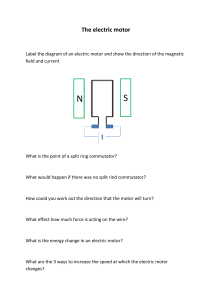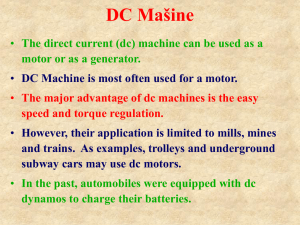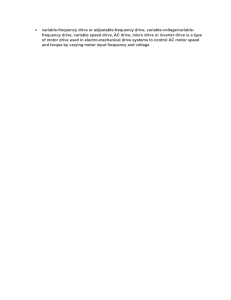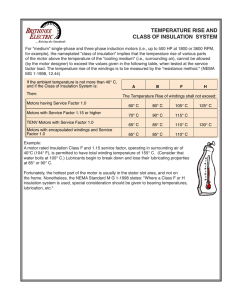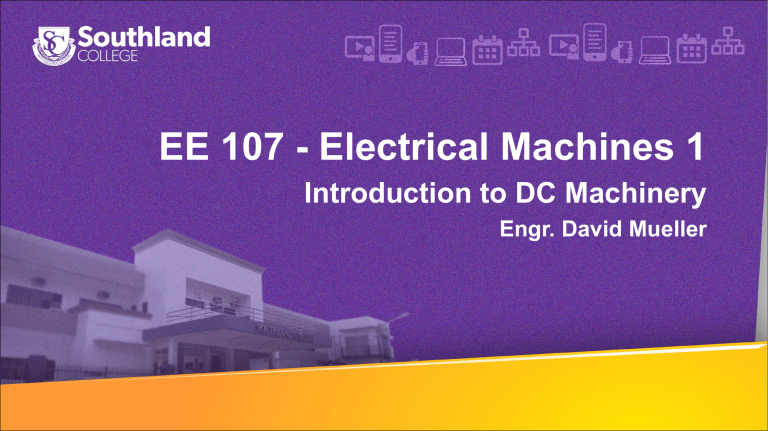
EE 107 - Electrical Machines 1 Introduction to DC Machinery Engr. David Mueller Lecture Outline • • • • • • • What are DC Machines? Types of DC Motors DC Machines Construction DC Motor Operation Current in DC Motor Magnetic Field in DC Motor Force in DC Motor Introduction: What are DC Machines? Are DC generators that convert mechanical energy to DC electric energy. Are DC motors that convert DC electric energy to mechanical energy. Chapman S.J., “Electric Machinery Fundamentals” 3 Introduction DC machine can be used as a motor or as a generator. DC Machine is most often used for a motor. Cutaway view of a dc motor DC motors are found in many special industrial environments Motors drive many types of loads from fans and pumps to presses and conveyors The major advantages of dc machines over generators are easy to control speed and torque regulation. However, their application is limited to mills, mines and trains. As examples, trolleys and underground subway cars may use dc motors. In the past, automobiles were equipped with dc dynamos to charge their batteries. 4 Types of DC Motors DC motors are classified according to electrical connections of armature windings and field windings. Armature windings: a winding which a voltage is induced Field windings: a winding that produces the main flux in machines Five major types of DC motors:- Separately excited DC motor Shunt DC motor Permanent Magnet DC motor Series DC motor Compounded DC motor 5 DC Machines Construction DC motor stator with poles visible Rotor of a dc motor 6 DC Machines Construction DC machines, like other electromechanical energy conversion devices have two sets of electrical windings . field windings - on stator amarture windings - on the rotor. 7 DC Machines Construction The stator of the dc motor has poles, which are excited by dc current to produce magnetic fields. In the neutral zone, in the middle between the poles, commutating poles are placed to reduce sparking of the commutator. The commutating poles are supplied by dc current. Compensating windings are mounted on the main poles. These shortcircuited windings damp rotor oscillations. 8 DC Machines Construction The poles are mounted on an iron core that provides a closed magnetic circuit. The motor housing supports the iron core, the brushes and the bearings. The rotor has a ring-shaped laminated iron core with slots. Coils with several turns are placed in the slots. The distance between the two legs of the coil is about 180 electric degrees. 9 DC Machines Construction The coils are connected in series through the commutator segments. The ends of each coil are connected to a commutator segment. The commutator consists of insulated copper segments mounted on an insulated tube. Two brushes are pressed to the commutator to permit current flow. The brushes are placed in the neutral zone, where the magnetic field is close to zero, to reduce arcing. 10 DC Machines Construction The commutator switches the current from one rotor coil to the adjacent coil, The switching requires the interruption of the coil current. The sudden interruption of an inductive current generates high voltages . The high voltage produces flashover and arcing between the commutator segment and the brush. 11 DC Motor Operation 12 Current in DC Motor 13 Magnetic Field in DC Motor 14 Force in DC Motor 15
